Liz Howard is one of Australia’s leading Osteopaths with experience in treating the pelvis. Working closely with Pain Physician and Gynaecologist Prof Thierry Vancaillie at the Women’s Health & Research Institute of Australia Liz sees the consequences of difficult births, pregnancies and prolonged labour every day. With the right approach, great clinical results can be achieved for many complex presentations and Liz is passionate about sharing her knowledge and experience in this area.
In Pain & Pregnancy, you’ll learn how to best assist patients prepare for birth as well as post-partum covering topics such as prolapse, diastasis recti, preventing nerve pain, pelvic girdle pain, post-cesarean care, breastfeeding ergonomics, and more.
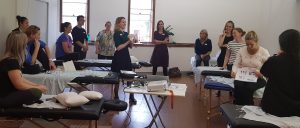 Treatment models, and direct and indirect techniques demonstrated are based on the latest clinical guidelines for reducing pelvic floor delivery trauma, managing pelvic girdle pain, and the prevention of post-partum complications in the short and long term. You will learn useful self-management tips that patients can utilize during pregnancy, in birth-planning and the post-partum period.
Treatment models, and direct and indirect techniques demonstrated are based on the latest clinical guidelines for reducing pelvic floor delivery trauma, managing pelvic girdle pain, and the prevention of post-partum complications in the short and long term. You will learn useful self-management tips that patients can utilize during pregnancy, in birth-planning and the post-partum period.
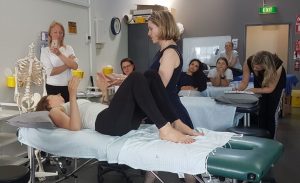
The Pain & Pregnancy course is applicable to all allied health manual therapy practitioners with no prior experience treating pregnancy pain required. It will include practical examination and treatment protocols you will be able to immediately use with confidence in your practice.
The course will run from 8:30 AM to 4 PM. It includes morning and afternoon tea, e-notes and an e-certificate of attendance for your CPD records. The course can be counted as 7 hours CPD.
After completing this course attendees will have the opportunity to attend Liz Howard’s Pelvic Pain Puzzle course which teaches the management of pelvic and perineal pain.
Advanced Pain Management Osteopath Liz Howard practices at the Women's Health & Research Institute of Australia, a specialist pelvic pain clinic in Sydney. She holds a Master of Science in Medicine (Pain Management) from USYD in 2013 and has over 25 years’ of experience as an osteopath, including pain education and as a clinical specialist in sacral neuromodulation.
Liz has more than 16 years’ of experience teaching at Australian universities and as a CPD provider. Her teaching experience ranges from course writing, presenting lectures and practicum in Undergraduate and Master’s Osteopathic programs (University of Western Sydney, Southern Cross University), clinical supervision of Osteopathic students (UWS, SCU, SportsMed Mumbai), to presentations at many professional associations including RANZCOG (Royal Australian & New Zealand College of Obstetrics & Gynaecology), AGES (Australasian Gynaecological Endoscopy & Surgery), NSANZ (Neuromodulation Society of Australia and New Zealand), Osteopathy Australia National Conference presentation, Pregnancy Massage Australia, Pelvic Floor Seminars, GP education evenings and international allied health events, most recently in Ireland, Sweden and New Zealand.
Find out more about Liz Howard's experience here.
Organisation and venue was great which left participants comfortable to concentrate on the excellent delivery of very helpful and relevant information and instruction. Well done everyone involved and a big thank you to Liz for so generously sharing her skill and expertise.
Gopi McLeod
This was hands down one of the best courses I have attended! The balance of updated info, the course structure and the hands on practice was brilliant. I especially enjoyed that you tailored the course to the attendees and the one day course structure so that I don't feel burned out on the weekend and it didn’t impact work as much as a two day course may have. Thank you very much to all of the tutors and Liz for your guidance and support.
Casey Beaumont
Clear instruction, straight to the point, no wasting time.
Leonardo Viola
Fascia is often the missing link for addressing persistent pain, pain after a fall or injury, immobilisation, recurrent acute back pain, movement restriction after surgery, post-surgical pain, contusion injuries, scar tissue and more.
There is a huge amount of current research to support how osteopaths work with the fascia in a holistic way to improve patient outcomes. This includes anatomical connections derived from embryology, neurovascular supply, connective tissue mechanics and mechanotransduction, interactions of the fascia with inflammation, cellular messengers, hormones and the immune system.
A thorough understanding of the physiology and pathophysiology of the fascial systems can help inform patient education, tailored movements and specific rehabilitation that is quite different to how we approach muscular dysfunction. Liz Howard has translated this research into a simple assessment and treatment model for local and global fascial dysfunction, to help select the best treatment techniques and self-management for your individual patient.
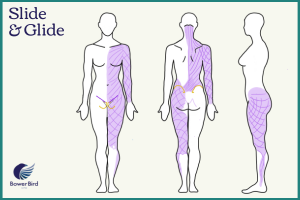
Learning Objectives
Related Learning
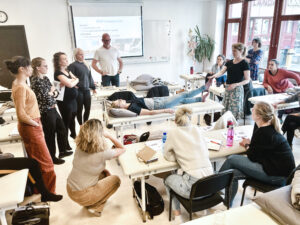
Attendees also have the opportunity to attend Liz Howard’s Exploring Visceral Fascia course which will look at the deeper chains in more detail, including viscero-fascial contributors to pain or dysfunction.
Course Details
The Myofascial Release course is applicable to all allied health manual therapy practitioners. It will include practical examination and treatment protocols you will be able to use with confidence in your practice.
The course will run from 8:30AM to 4PM. Places are limited to 12 attendees. It also includes morning and afternoon tea, e-notes and an e-certificate of attendance for your CPD records. The course can be counted as 6 hours CPD.
About the Presenter
Advanced Pain Management Osteopath Liz Howard practices at the Women's Health & Research Institute of Australia, a specialist pelvic pain clinic in Sydney. She holds a Master of Science in Medicine (Pain Management) from USYD in 2013 and has over 25 years’ of experience as an osteopath, including pain education and as a clinical specialist in sacral neuromodulation.
Liz has more than 16 years’ of experience teaching at Australian universities and as a CPD provider. Her teaching experience ranges from course writing, presenting lectures and practicum in Undergraduate and Master’s Osteopathic programs (University of Western Sydney, Southern Cross University), clinical supervision of Osteopathic students (UWS, SCU, SportsMed Mumbai), to presentations at many professional associations including RANZCOG (Royal Australian & New Zealand College of Obstetrics & Gynaecology), AGES (Australasian Gynaecological Endoscopy & Surgery), NSANZ (Neuromodulation Society of Australia and New Zealand), Osteopathy Australia National Conference presentation, Pregnancy Massage Australia, Pelvic Floor Seminars, GP education evenings and international allied health events, most recently in Ireland, Sweden and New Zealand.
Find out more about Liz Howard's experience here.
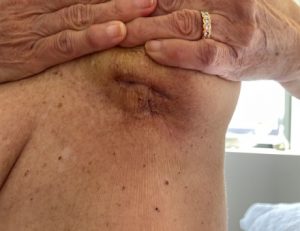 1 in 8 women in Australia will be diagnosed with breast cancer in their lifetime. Thankfully the 5-year survival rate is over 90%, however as they try to move forward with their lives, they continue to deal with the long-term side effects of their treatment journey.
1 in 8 women in Australia will be diagnosed with breast cancer in their lifetime. Thankfully the 5-year survival rate is over 90%, however as they try to move forward with their lives, they continue to deal with the long-term side effects of their treatment journey.
This treatment commonly results in significant scarring, adhesions, fibrous tissue, hard and lumpy breasts, rippled or contracted breast implants and even chronic pain. Current management is focused on exercise prescription or self-massage advice leaving a significant gap in the post-treatment care of breast cancer patients which osteopathy is well placed to help fill.
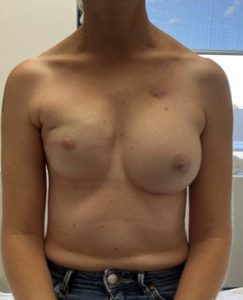
This one-day course will expand your understanding of breast cancer classification, diagnosis and treatments. You will gain an understanding of how common side effects develop based on the current research, and how to apply an osteopathic approach to help provide relief.
Course participants will leave with an understanding of the different types of breast cancer, the medical treatment these patients undertake and the impact of each of these forms of treatment on the tissues of the body. The course will explain the primary side effects these women experience and provide an osteopathic approach to caring for them during their recovery.
After Breast Cancer has a strong practical focus including treatment protocols that you can use to make a significant impact on your patients’ lives by relieving discomfort, changing distorted breasts to look and feel ‘normal’, and allowing patients to feel comfortable in their bodies again. Many of the techniques learned can be applied to any form of post-traumatic or post-surgical scar.
Theory Component
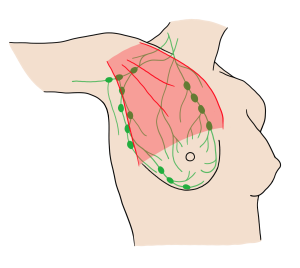
Practical Component
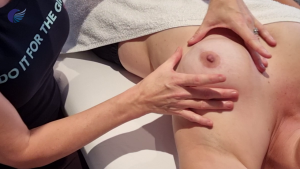
This course is open to osteopaths of all genders.
Participants will be required to expose breast tissue to practice on each other. Breast techniques will be undertaken only with consent and with all due sensitivity. Where possible direct palpation will occur underneath draping to protect the modesty of our participants so please bring a thin, cotton singlet for this purpose as bras will need to be removed.
The course will run from 8:30AM to 4:30PM with around an 1 hour of pre-learning videos. Places are limited to 20 attendees. It also includes morning and afternoon tea and an e-certificate of attendance for your CPD records. The course can be counted as 8 hours CPD.
Amanda Hannaford is an experienced osteopath who works exclusively with breast cancer patients. She currently practices as part of the interdisciplinary team at the Northern Beaches Breast Clinic, the Mater Hospital’s Centre For Wellbeing and is the founder and director of Restore Health & Wellness in St Leonards, Sydney.
Amanda’s patients are referred by Oncology Breast Surgeons, Radiation Oncologists, Medical Oncologists and McGrath Breast Care Nurses. She is enthusiastic about the future of osteopathy in this field and has developed her After Breast Cancer CPD course to encourage other osteopaths to feel comfortable to care for these patients in their own practices.
Amanda has been practicing in Sydney for 20 years and has been an osteopathic university lecturer and a registration board examiner.
Find out more about Amanda Hannaford’s experience here.
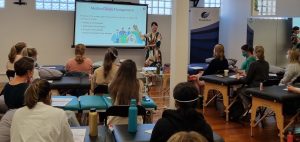
The way I've been describing it to people is, ‘sometimes you do a course and it might be good, but a bit watery. This course was juicy’!!
Amanda is such a genuinely engaging and inspiring teacher. She is warm and fun and has the life experience to back it up. I would recommend this course to anyone thinking of doing it!! I'm so excited to start helping women post breast cancer!
Roz Hill
As an osteopath and someone with a lived experience of breast cancer, I am so pleased that this course was created. I think osteopaths/manual therapists have so much to offer these patients. I highly recommend this course to anyone interested in working with patients with a history of breast cancer.
Reena Murray
Loved it all! It was very useful to have the pre-learning set up as you've done it. The face to face was great and Amanda was an excellent presenter. I felt very comfortable with all the hands-on learning; thank you for creating a safe, supportive and welcoming space of learning. And the handbook is an amazing resource. Thank you so much.
Narelle Crabbe
Amanda was so great in providing a good depth of knowledge and demonstrating the immense growth she has achieved in this field. What an asset to osteopathy! I also appreciated learning about referral ideas and things doctors/GP's in this field appreciate seeing in letters to build a good referral source. As someone who has completed several women's health osteopathy courses in Australia and the UK, this course really provided entirely knew knowledge to me.
Sarah
Amanda is a fantastic presenter! The course content was excellent with a great mix of practical techniques, to go along with the theory. For practitioners concerned about never providing Breast Cancer after-care to their patients, the techniques here are just as relevant to any patient undergoing wound healing post-surgery or trauma. The information I gleaned from Amanda enabled me to more deeply connect with several of my patients, who I usually treat for musculoskeletal complaints, and who have had breast cancer, and this greatly enhanced the rapport and trust that I have with them. These patients were elated and appreciative of my greater understanding of their journey. As the only male practitioner at the course I would like to thank Amanda and the rest of the course participants for being so inclusive and welcoming of me being there.
To say the material covered in this course is groundbreaking anywhere, let alone in our osteopathic practices, is a major understatement!!!
Tomas Leszczynski
Loved the presenter she was engaging, personal and professionally knowledgeable - a tricky balance to strike. Really helped to discuss and explore anatomy I have pondered in clinic. Well facilitated and clinically-relevant.
Ruth Atkinson
Amanda's course is very helpful in putting a protocol together for patients recovering post breast cancer treatment as there is a gap and a lack of understanding currently in both the medical industry and also the patients are not provided with supportive information towards their healing. I walked away from this course with better understanding regarding the type of cancers, the possible treatment protocols they receive and how we as osteopaths can assist these patients in their recovery. Thank you Amanda
Ilona Wagner
I loved the presenter, the topic, the approach, and techniques. I was able to take the techniques straight back to clinic and everything she described was what I felt and how the consult proceeded. From the patient crying and the location and feel of the scarring to the change in the tissues and her tummy rumbling.
Amanda Viedma-Dodd
Loved the topic. Amanda was a great presenter and it was a real pleasure to learn from her and learn more about her work and her unique perspective on osteopathy and breast cancer care.
I felt really inspired.
Kate Henderson
I loved everything about it. It was very informative and easy to comprehend and follow along with. Everything felt relevant and was presented in an enjoyable way. I left feeling like I knew so much more than I did before the course and like I could implement a lot of what I learnt straight away.
Chloe
The course was fantastic. Amanda has done a beautiful job in collating relevant information and giving a well rounded approach to breast care. She was so generous with her resources, her experience and equipping us with skills to be able to make a difference for breast cancer and breast augmentation patients.
Chrissy Weston
Have you considered treating the liver for neck pain after a whiplash injury?
Do you know how to assess for restriction within the abdominal fascia after a surgery?
Sick of treating back pain without any new tricks?
From the head to the pelvis and beyond, the visceral fascia is one of the most complex fascias in the body and fundamentally involved with distributing the major neurovasculature to the thoracic, abdominal and pelvic systems.
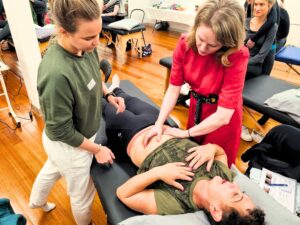 The connections of the visceral fascia to MSK structures are often overlooked when considering pain presentations that don't change with usual manual therapy techniques. Visceral fascial has strong connections throughout the body that can be affected with injuries that involve a fast moving force such as whiplash, a blunt trauma or a previous abdominal surgery.
The connections of the visceral fascia to MSK structures are often overlooked when considering pain presentations that don't change with usual manual therapy techniques. Visceral fascial has strong connections throughout the body that can be affected with injuries that involve a fast moving force such as whiplash, a blunt trauma or a previous abdominal surgery.
Learning to identify and treat visceral fascia can be the missing link to addressing all kinds of MSK issues in ways that you may not consider.
In this course from advanced pain management osteopath Liz Howard you will learn to confidently examine and treat visceral fascia contributors to pain or dysfunction. You will practice a range of effective techniques and treatment models that will enable you to confidently treat the supportive fascia of the thorax and abdominal viscera, including links to the musculo-skeletal system.
Exploring Visceral Fascia has a strong practical focus including treatment models (patient education and self-management tools) that you can use immediately in your practice to improve patient outcomes.
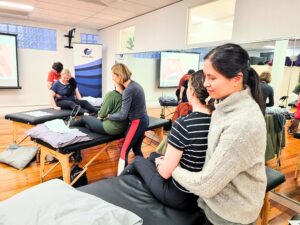 Related Learning
Related LearningThis course follows on from Liz Howard’s Myofascial Release or Myofascial Release Online course which explores the functional anatomy and amazing properties of fascia and introduces assessment, protocols and techniques to address myofascial restrictions and contributors to pain.
Attendees can choose to register for Myofascial Release Online as well as Exploring Visceral Fascia and recieve 20% off. Select the Visceral registration + Myofascial Online ticket option.
The Exploring Visceral Fascia course is applicable to all allied health manual therapy practitioners. It will include practical examination and treatment models you will be able to use with confidence in your practice.
The course will run from 8:30AM to 4PM. Places are limited to 20 attendees. It also includes morning and afternoon tea, printed notes and an e-certificate of attendance for your CPD records. The course can be counted as 6 hours CPD.
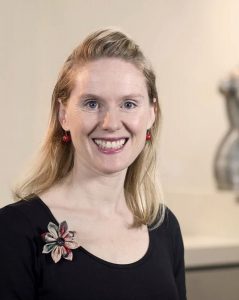
Advanced Pain Management Osteopath Liz Howard practices at the Women's Health & Research Institute of Australia, a specialist pelvic pain clinic in Sydney. She holds a Master of Science in Medicine (Pain Management) from USYD in 2013 and has over 25 years’ of experience as an osteopath, including pain education and as a clinical specialist in sacral neuromodulation.
Liz has more than 16 years’ of experience teaching at Australian universities and as a CPD provider. Her teaching experience ranges from course writing, presenting lectures and practicum in Undergraduate and Master’s Osteopathic programs (University of Western Sydney, Southern Cross University), clinical supervision of Osteopathic students (UWS, SCU, SportsMed Mumbai), to presentations at many professional associations including RANZCOG (Royal Australian & New Zealand College of Obstetrics & Gynaecology), AGES (Australasian Gynaecological Endoscopy & Surgery), NSANZ (Neuromodulation Society of Australia and New Zealand), Osteopathy Australia National Conference presentation, Pregnancy Massage Australia, Pelvic Floor Seminars, GP education evenings and international allied health events, most recently in Ireland, Sweden and New Zealand.
Find out more about Liz Howard's experience here.
It had heaps of relevant information which was delivered in a really easy to understand and enjoyable manner. Liz was a fantastic presenter and the printed course notes were a huge help. I found the case studies really useful as they were helpful in terms of understanding how the fascial techniques could be applied and also from the note-keeping perspective.
Fiona Spring
Liz is by far one of my favourite presenters. She is down to earth and very approachable but has such a wealth of knowledge and experience and a great way of distilling and presenting information. The content was perfectly contained, with just the right amount of material to come away with something to use straight away and not feel overwhelmed.
The courses are always a really reasonably price, which I appreciate. The online content was well presented and easy to watch.
Sara Jane Hammond
The information was imparted with clarity and ease. The group was small, which made for a fully engaged learning experience.
Liz is a wonderful teacher. She doesn't come from a place of ego-driven boasting, which many presenters do, but communicates well and shares her knowledge generously.
It was a fabulous course which I thoroughly enjoyed and have put to good use in my daily practice.
Sarah Simpson-Goff
Treating pelvic pain is a common, yet challenging area of practice. The contributing factors can be multiple and the presentation may seem like a complex puzzle. Patients are often embarrassed to speak about their symptoms meaning allied health has a unique opportunity to spend more time with the patient to develop the rapport and trust required for this intimate area.
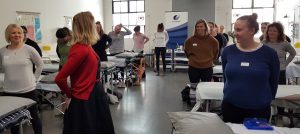
In this course you will review the embryology, anatomy, physiology and common presentations of the pelvic region to help unravel the pelvic pain puzzle for your patients. Conditions covered include pudendal neuralgia and visceral pain such as dysmenorrhea and endometriosis.
Gain an up-to-date understanding of the normal function of the female pelvis and organs, how dysfunction presents clinically and learn the treatment models, and direct and indirect techniques that Liz uses in daily practice when treating pelvic pain presentations
The Pelvic Pain Puzzle CPD course will cover;
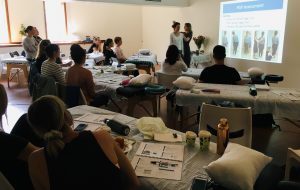
The Pelvic Pain Puzzle course is applicable to allied health manual therapy practitioners with an interst in treating pelvic pain. It has a strong practical focus and includes appropriate manual therapy techniques that you can immediately use with confidence in your practice. Internal techniques will not be demonstrated.
The course will run from 8:30AM to 4PM. Places are limited to 12 attendees. It includes morning and afternoon tea, printed course notes and an e-certificate of attendance for your CPD records. The course can be counted as 7 hours CPD.
This course follows on from Liz Howard’s popular Pain & Pregnancy course which teaches practitioners to effectively help women during pregnancy (pelvic girdle pain etc), prepare for labour and recover efficiently from delivery or caesarean section. In this course pelvic girdle pain will be reviewed but not addressed in depth.

Advanced Pain Management Osteopath Liz Howard practices at the Women's Health & Research Institute of Australia, a specialist pelvic pain clinic in Sydney. She holds a Master of Science in Medicine (Pain Management) from USYD in 2013 and has over 25 years’ of experience as an osteopath, including pain education and as a clinical specialist in sacral neuromodulation.
Liz has more than 16 years’ of experience teaching at Australian universities and as a CPD provider. Her teaching experience ranges from course writing, presenting lectures and practicum in Undergraduate and Master’s Osteopathic programs (University of Western Sydney, Southern Cross University), clinical supervision of Osteopathic students (UWS, SCU, SportsMed Mumbai), to presentations at many professional associations including RANZCOG (Royal Australian & New Zealand College of Obstetrics & Gynaecology), AGES (Australasian Gynaecological Endoscopy & Surgery), NSANZ (Neuromodulation Society of Australia and New Zealand), Osteopathy Australia National Conference presentation, Pregnancy Massage Australia, Pelvic Floor Seminars, GP education evenings and international allied health events, most recently in Ireland, Sweden and New Zealand.
Find out more about Liz Howard's experience treating pelvic pain here.
I thought the course was fantastic! Incredibly well presented, very concise and interactive, and left me feeling confident and enthusiastic about applying it to my practice.
Jane Edmondson
Liz is an inspiring and engaging presenter, she shares extensive clinical knowledge of pelvic and perineal pain by way of case studies and current evidence-based practice protocols. Liz relates current clinical application models for chronic pain seamlessly with familiar osteopathic principles. This course has helped me to develop my confidence in diagnosing and treating patients with pelvic and perineal pain in a way that is immediately transferable to my every day practice.
Bimbi Joy
Loved that it was not too overwhelming and built on lots of techniques we have all learnt! Best course I've been to in a while.
Rebecca Brugman
Liz was a knowledgeable and witty presenter. She explained her material and linked it to research which I appreciated. I liked that her techniques were functional based, often these are overlooked and aren't linked to research. I also like how she discussed how she problem solves in practice. I found the practical side really easy to integrate into practice and very relatable.
ANON
I loved the way the presentation flowed, it was easy to follow and had great info on the slides. I also loved the practical, Liz came around and gave great feedback. The snacks were also amazing. The pre-learning videos were incredibly helpful and the notes I took from it have been a great resource for me to refer back to.
Olivia
Liz. She's fabulous. Dynamic, relatable, knowledgeable, I could go on...
Amanda Viedma-Dodd
Treating pelvic pain is a common, yet challenging area of practice. The contributing factors can be multiple and the presentation may seem like a complex puzzle. Patients are often embarrassed to speak about their symptoms meaning allied health has a unique opportunity to spend more time with the patient to develop the rapport and trust required for this intimate area.

In this course you will review the embryology, anatomy, physiology and common presentations of the pelvic region to help unravel the pelvic pain puzzle for your patients. Conditions covered include pudendal neuralgia and visceral pain such as dysmenorrhea and endometriosis.
Gain an up-to-date understanding of the normal function of the female pelvis and organs, how dysfunction presents clinically and learn the treatment models, and direct and indirect techniques that Liz uses in daily practice when treating pelvic pain presentations
The Pelvic Pain Puzzle CPD course will cover;

The Pelvic Pain Puzzle course is applicable to allied health manual therapy practitioners with an interst in treating pelvic pain. It has a strong practical focus and includes appropriate manual therapy techniques that you can immediately use with confidence in your practice. Internal techniques will not be demonstrated.
The course will run from 8:30AM to 4PM. Places are limited to 20 attendees. It includes morning and afternoon tea, printed course notes and an e-certificate of attendance for your CPD records. The course can be counted as 7 hours CPD.
This course follows on from Liz Howard’s popular Pain & Pregnancy course which teaches practitioners to effectively help women during pregnancy (pelvic girdle pain etc), prepare for labour and recover efficiently from delivery or caesarean section. In this course pelvic girdle pain will be reviewed but not addressed in depth.

Advanced Pain Management Osteopath Liz Howard practices at the Women's Health & Research Institute of Australia, a specialist pelvic pain clinic in Sydney. She holds a Master of Science in Medicine (Pain Management) from USYD in 2013 and has over 25 years’ of experience as an osteopath, including pain education and as a clinical specialist in sacral neuromodulation.
Liz has more than 16 years’ of experience teaching at Australian universities and as a CPD provider. Her teaching experience ranges from course writing, presenting lectures and practicum in Undergraduate and Master’s Osteopathic programs (University of Western Sydney, Southern Cross University), clinical supervision of Osteopathic students (UWS, SCU, SportsMed Mumbai), to presentations at many professional associations including RANZCOG (Royal Australian & New Zealand College of Obstetrics & Gynaecology), AGES (Australasian Gynaecological Endoscopy & Surgery), NSANZ (Neuromodulation Society of Australia and New Zealand), Osteopathy Australia National Conference presentation, Pregnancy Massage Australia, Pelvic Floor Seminars, GP education evenings and international allied health events, most recently in Ireland, Sweden and New Zealand.
Find out more about Liz Howard's experience treating pelvic pain here.
I thought the course was fantastic! Incredibly well presented, very concise and interactive, and left me feeling confident and enthusiastic about applying it to my practice.
Jane Edmondson
Liz is an inspiring and engaging presenter, she shares extensive clinical knowledge of pelvic and perineal pain by way of case studies and current evidence-based practice protocols. Liz relates current clinical application models for chronic pain seamlessly with familiar osteopathic principles. This course has helped me to develop my confidence in diagnosing and treating patients with pelvic and perineal pain in a way that is immediately transferable to my every day practice.
Bimbi Joy
Loved that it was not too overwhelming and built on lots of techniques we have all learnt! Best course I've been to in a while.
Rebecca Brugman
Liz was a knowledgeable and witty presenter. She explained her material and linked it to research which I appreciated. I liked that her techniques were functional based, often these are overlooked and aren't linked to research. I also like how she discussed how she problem solves in practice. I found the practical side really easy to integrate into practice and very relatable.
ANON
I loved the way the presentation flowed, it was easy to follow and had great info on the slides. I also loved the practical, Liz came around and gave great feedback. The snacks were also amazing. The pre-learning videos were incredibly helpful and the notes I took from it have been a great resource for me to refer back to.
Olivia
Liz. She's fabulous. Dynamic, relatable, knowledgeable, I could go on...
Amanda Viedma-Dodd